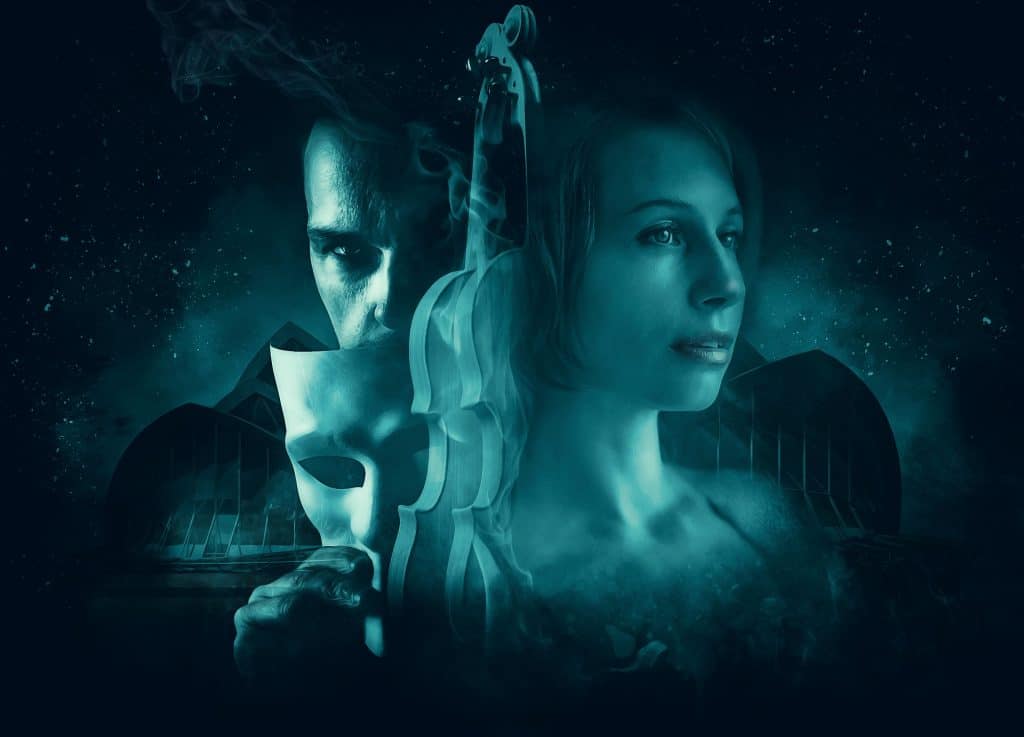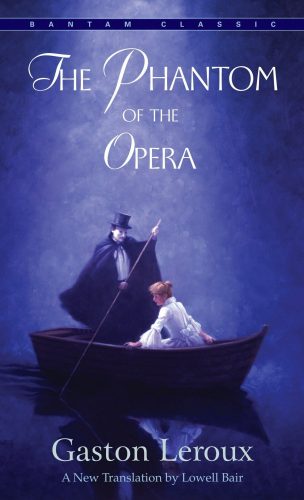A Classic that is Better as a Musical
Author: Gaston Leroux
Have you ever had a book that has just sat on your shelf forever? A book that you lovingly run your hands over as you walk by, anticipating the future greatness – the sheer perfection of finally sitting down to read it? Have you ever, actually, bought progressively better versions of this book because you just knew you are going to love it? And then finally, finally, that perfect day comes when the sun is shining, the birds tweeting, the coffee perking, and you sit down with that near-legendary book, years of longing coalescing into the perfect moment, only to discover that the story is, in fact, an utter letdown. This was unfortunately my exact experience with Phantom of the Opera. Andrew Lloyd Webber may have made the music of the night resound with passion and poignancy, a dark sensuality covering years of insanity inducing loneliness, but the actual written story is woven from a far cheaper fabric.
Leroux’s work covers a vast array of hyper characters, all of whom are overacted and yet underwhelming. We begin at the Paris Opera House with two new managers who, on their first day, learn that their theater hosts a ghost. A ghost who can be paid off. This specter requires both a private opera box and a direct deposit. Do this, and he will conveniently leave everyone to go their merry way. Fail on these two conditions: death, disaster, dismay, and other fiendish tricks ensue. The opera managers think it’s all a funny prank at the expense of their newness, but the phantom is willing to prove just how volatile he is.
 Meanwhile, a new opera singer is rising in the ranks. Christine Daaé is devoted to her art, and when a mysterious voice begins teaching her to sing, she remembers her father’s parting words. An angel of music will teach her, will bring her fame and fortune. This angel, however, is a bit more devilish than expected, and when Christine attempts to take a paramour, things get a bit weird.
Meanwhile, a new opera singer is rising in the ranks. Christine Daaé is devoted to her art, and when a mysterious voice begins teaching her to sing, she remembers her father’s parting words. An angel of music will teach her, will bring her fame and fortune. This angel, however, is a bit more devilish than expected, and when Christine attempts to take a paramour, things get a bit weird.
While the new opera managers keep testing the ghost, spending page after page trying to figure out the trick of a disappearing bank note, becoming ever more hysterical, Daaé meets with her boyfriend in plain sight and hearing, the couple not being too high on the intellectual spectrum. At the same time a mysterious figure begins to search for the ghost in the depths of the labyrinthine opera house. All these people finally come together to play a role in the ghost’s machinations.
Admittedly, it’s a good premise. Our cultural obsession with it showcases the basic value of the story, but if you’re picturing Webber’s phantom, a sinister but sympathetic soul, then you’re in for an unpleasant surprise. The original Phantom of the Opera is a chaotic story stuck somewhere between a cheap thriller and a bare bones screenplay. There is hardly any depth, and none of the characters, villains or victims, are especially likable, much less deeply poignant.
First: our villain. Leroux’s phantom is more Scooby Doo like than misunderstood. He plays tricks and dresses-up, is petty and churlish, cries an awful lot about nothing, and is manic in the way of a late night monster movie actor screaming at a fake ghoul. He over and under acts and reacts in the story and has more in common with a spoiled and maladjusted child than a love-to-hate-him outcast. Likewise, his love for Daaé is far more creepy-white-van killer than romantic highwayman.
Daaé is hard to care about either. It’s partly her blatant brainlessness and total lack of logic. She fails to escape when it is easy, has border-line Stockholm syndrome, and legitimately falls in a lets-risk-our-lives-unnecessary love with the literal first man to speak to her.
 In between all the overacted melodrama, the story drags, and little of the phantom’s past makes sense, including his almost sci-fi like torture room. Finally, a new figure arrives (because our characters can do nothing and the opera managers are literally still arguing about the disappearing money while chandeliers crash on the audience). This new figure is mysterious for the mere fact of being Persian (really?) and basically, magically, knows absolutely everything to do. In the last few hurried minutes of the story, he conveniently reveals the phantom’s sordid back-story and why he is a jerk (he is, by the way.)
In between all the overacted melodrama, the story drags, and little of the phantom’s past makes sense, including his almost sci-fi like torture room. Finally, a new figure arrives (because our characters can do nothing and the opera managers are literally still arguing about the disappearing money while chandeliers crash on the audience). This new figure is mysterious for the mere fact of being Persian (really?) and basically, magically, knows absolutely everything to do. In the last few hurried minutes of the story, he conveniently reveals the phantom’s sordid back-story and why he is a jerk (he is, by the way.)
It finally ends after a strange, unlikely adventure sequence. The opera managers miss it all though because they are STILL talking about the bank note trick. Everyone is happily ever after (except the dead people and the phantom), the mystery is solved, yada yada.
The entire narrative is torpid. It’s choppy, often insipid, and frankly boring. I tried so hard to like it. I have looked forward to reading this book for years. I even had the tunes sparking in my brain as I picked up the book, and for the sake of its classic status and what could have been, I tried to like it. But honestly, just stick to the musicals on this one. This is one of the rare instances where the book is NOT better.
– Frances Carden
Follow my reviews on Twitter at: https://twitter.com/xombie_mistress
Follow my reviews on Facebook at: https://www.facebook.com/FrancesReviews
- Book Vs Movie: The Shining - April 6, 2020
- Thankful For Great Cozy Mysteries - December 13, 2019
- Cozy Mysteries for a Perfect Fall - October 20, 2019



